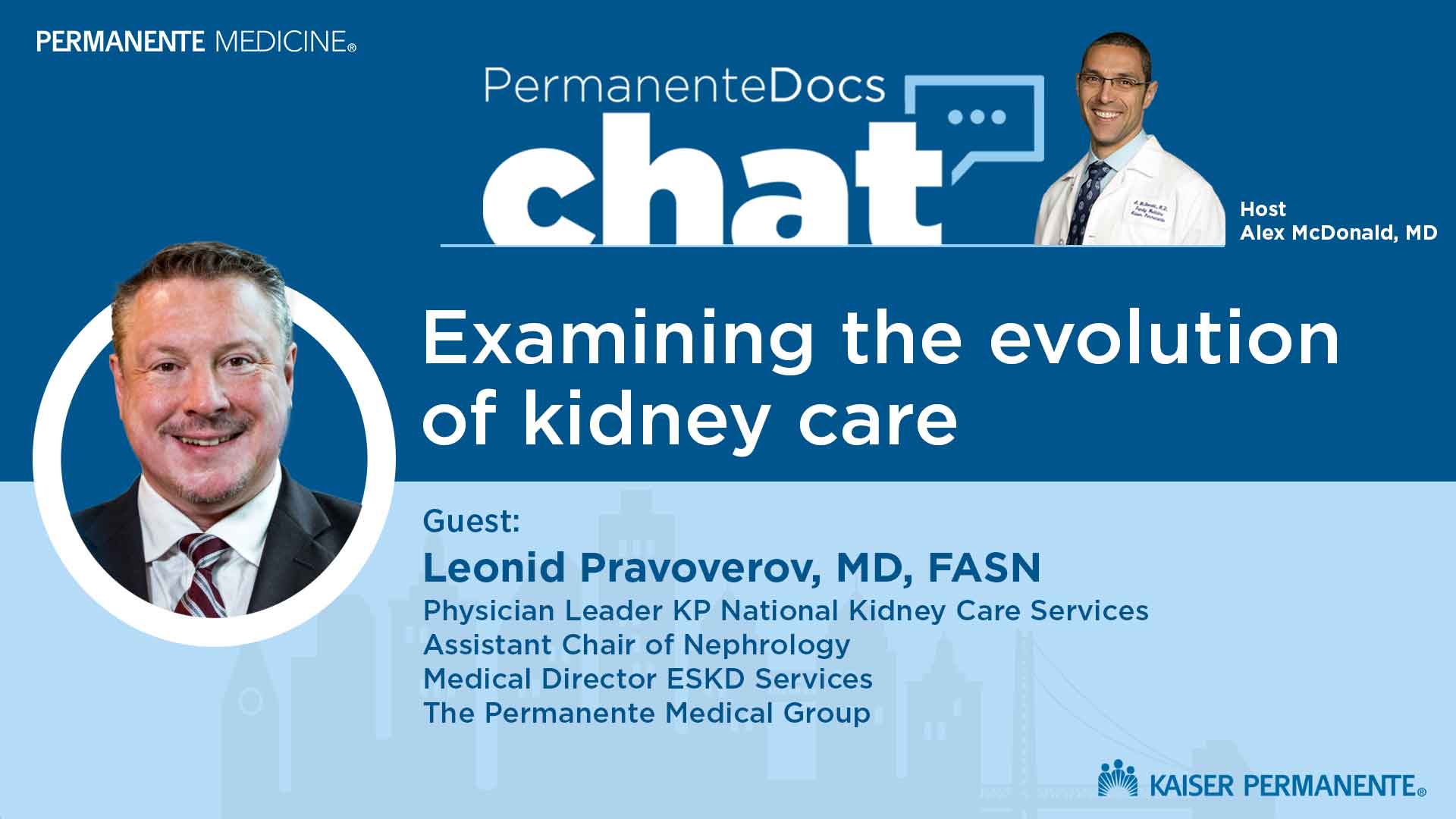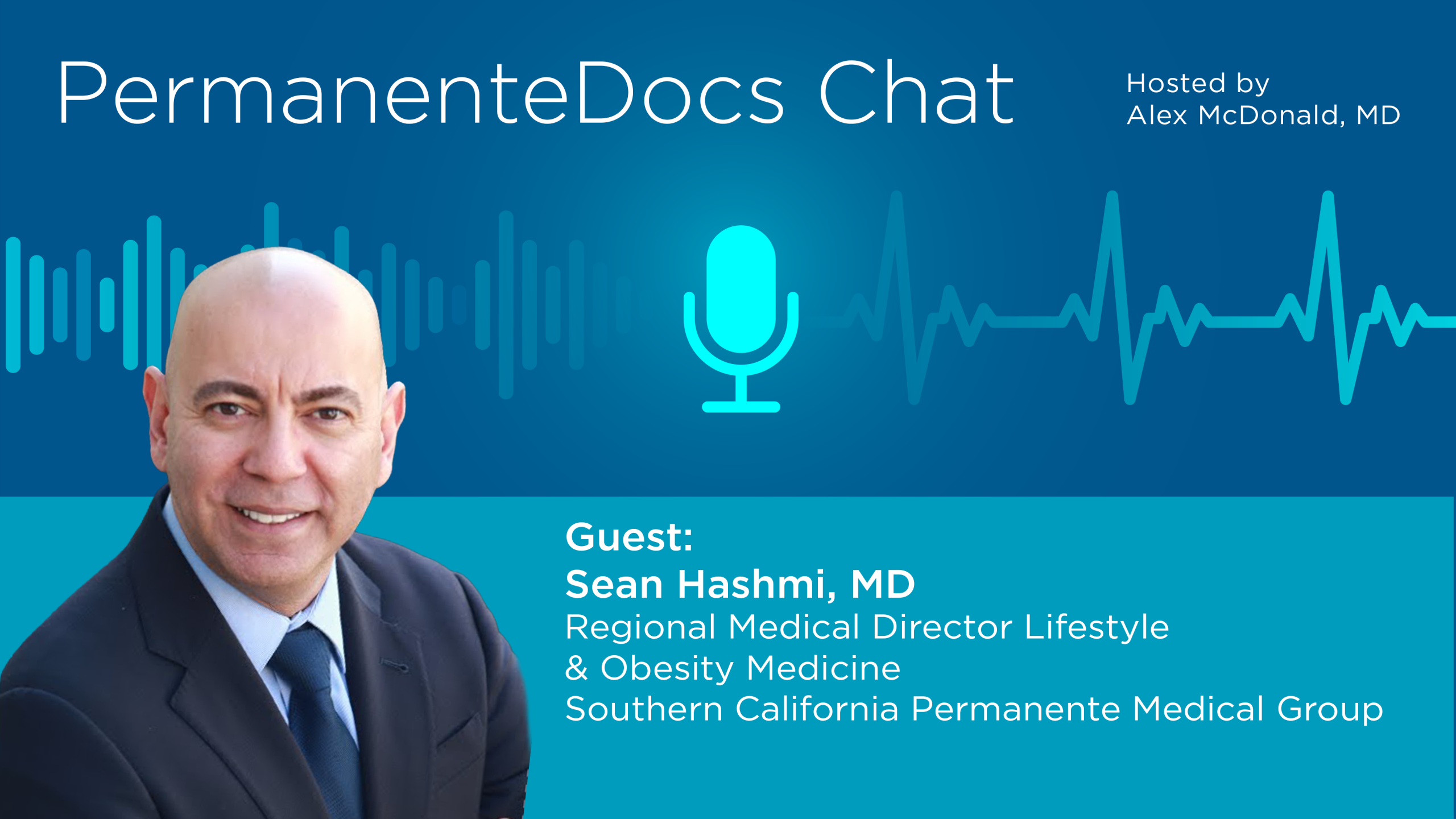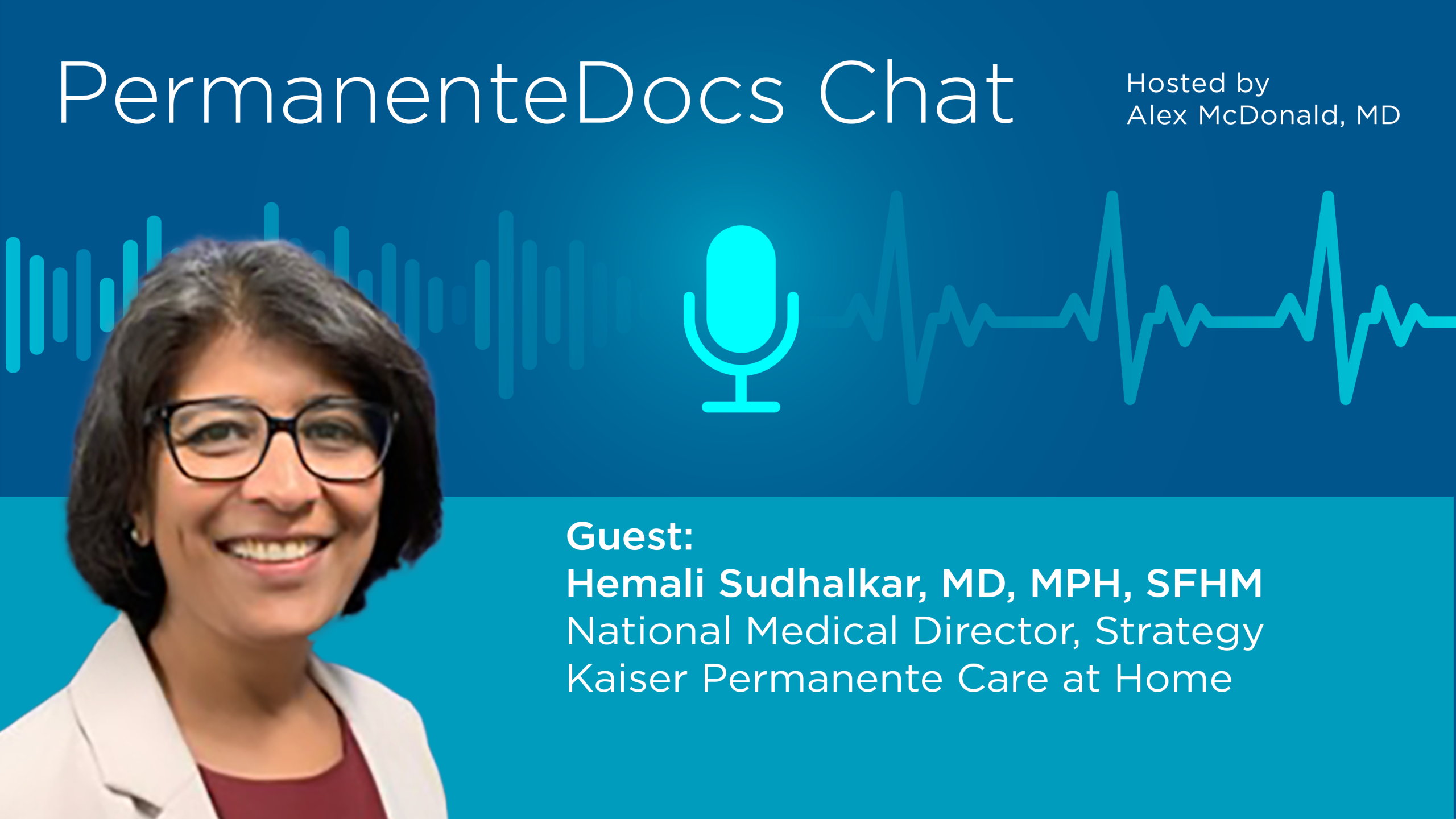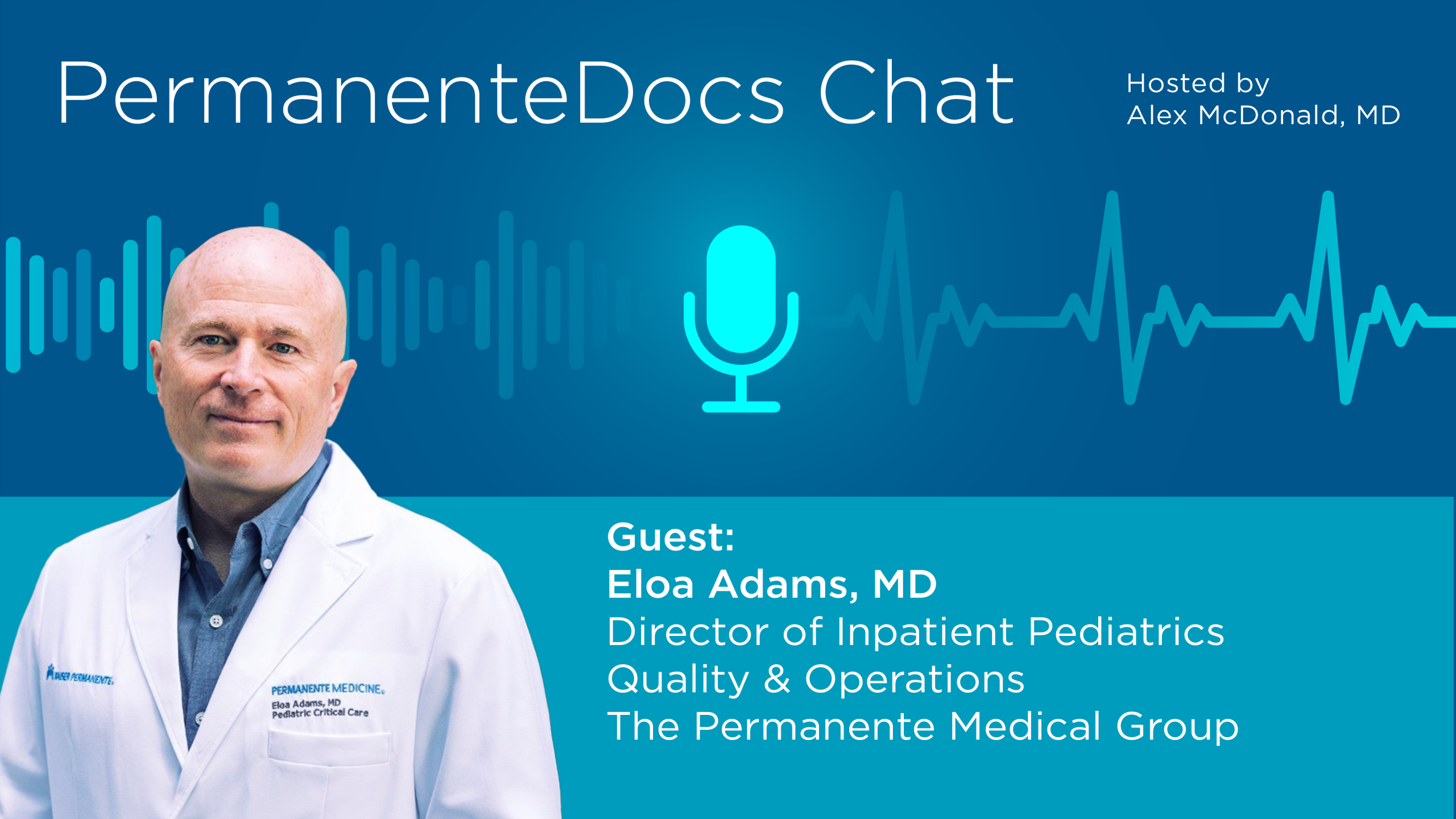How physicians integrate GLP1s into long-term weight management GLP-1 medications are reshaping the conversation…

The present and future of kidney care
In recognition of National Kidney Month, watch or listen to this informative discussion on the present and future of kidney care. Host Alex McDonald, MD, and guest Leonid Pravoverov, MD, FASN, explore the importance of team-based care, the effectiveness of lifestyle medicine in prevention, the value of early testing, current and future innovations, and more.
Guest
- Leonid Pravoverov, MD, FASN, physician leader, KP National Kidney Care Services; assistant chair of Nephrology and medical director ESKD Services, The Permanente Medical Group
Podcast transcript
Transcript is autogenerated. Although edited for clarity, it should not be considered an exact replication of the podcast and may also be updated as needed.
Alex McDonald, MD: Hello everyone. Welcome to today’s PermanenteDocs Chat. I’m your host, Alex McDonald. I practice sports medicine and family medicine here in Fontana, California, as part of the Southern California Permanente Medical Group. Today we are talking about kidney health in honor of National Kidney Month this March. I am joined by Dr. Leo Pravoverov, who is the physician leader of Kaiser Permanente National Kidney Care Services and assistant chair of nephrology at The Permanente Medical Group.
Leonid Pravoverov, MD: Thank you for having me here.
AM: We’re very excited to have this conversation. This is a really important topic regarding kidney health and raising awareness. Let’s jump right in here. Leo, tell us who you are and what you do.
LP: I’m a nephrologist practicing in North California, in Oakland, with Kaiser Permanente for almost 20 years. Besides being a practicing nephrologist for the last few years, I serve as a physician leader in national kidney care services. That was one of the first disease-specific, national program-wide groups to oversee the very complex care for patients with chronic kidney disease, from beginning to end, meaning from the point of recognition of diagnosis through the whole journey, through the different stages of kidney disease, dialysis, transplantation, end of life. As you know, kidney disease is a huge burden on society and patients on multiple levels. 37 million people in United States are estimated to have some form of kidney disease and the most striking [thing] is that the majority of them are not aware of it. Almost 90% of those patients not aware that they have it and they usually [learn] about it too late. We have a small but very interesting team of both physicians and administrators who engage in it, and the wonderful groups of people in each market.
AM: Great. Kidneys are a critical organ and during the month of March, we’re going to try to make sure we raise awareness for National Kidney Month. So, 37 million people have some kind of chronic kidney disease and most of them don’t know about it. Can you share a little bit about that staggering statistic, as well as the burden that this puts on society?
The present impact of kidney disease
LP: Sure. Kidney disease is a very unrecognized condition. Again, a huge number of people have it, a very small proportion of them actually are aware. The majority of kidney disease comes from diabetes and hypertension, it’s a part of the recently recognized cardiovascular kidney metabolic health syndrome pronounced by the American Heart Association. There is a very intricate connection between obesity, lifestyle, diet, and diabetes, hypertension, and other chronic conditions. The disease burden is estimated in the hundreds of millions of dollars to society and the health care system. This is not counting the huge burden to patients themselves, the loss of employment, loss of wages, the lifestyle, and just pure suffering.
As a nephrologist, when I’m talking to the patients and breaking the news, [their] biggest fear is dialysis. This is something that completely changes a person’s life. And the access to kidney transplant, which is ultimately the best solution to kidney failure, is very much restricted by the number of available organs, so there are wait times and [the related] suffering. I always view kidney disease as part of this chronic conditions burden that we as an organization and that health care [in general] have to solve. It’s a multifaceted puzzle and chronic kidney disease is [one piece].
AM: As a primary care physician myself who works both in the hospital and here in the clinic, [I see] these patients and the burden it puts on them, not only physiologically but psychologically. Obviously, this is an issue which is critically important to nephrologists — and primary care physicians are very often the first line in terms of preventing kidney disease — but why should other physicians care about this? What would your message be to other doctors who don’t necessarily think about the kidney quite as much as maybe you or I do?
LP: I think everybody should know about kidney disease, especially if you’re a health care professional. We see a wide variety of patients passing through our clinics, hospitals, emergency rooms, and various settings, so just acknowledging that the person has a chronic condition [is important]. Everybody’s more or less aware of diabetes or high blood pressure and try to address it every time they see patients. But kidney disease brings unique risks to any procedure, and any surgical procedure or prescription needs to be adjusted to avoid any potential harm. And [also when] looking into choice of therapies. I think kidney disease needs to be factored into this complex, holistic approach to patient [care]. In the past few years there has been a lot of talk about diet and lifestyle modifications, and I think that’s another opportunity for primary care physicians and any practitioner to bring it up, not just with [medications], but recommendations of lifestyle modifications for patients with a chronic condition.
Testing for chronic kidney disease
AM: I completely agree. Now you’re speaking my language as a preventive medicine, lifestyle medicine physician myself. Well, how do we raise awareness? How do we increase early detection of renal disease? Are there new guidelines or any new screening updates or recommendations which have recently been announced or that are in process at this point?
LP: There are multiple organizations with recommendations. As a nephrologist, I follow American Society of Nephrology recommendations, [which] recommend screening for patients in high-risk groups with diabetes, hypertension, obesity, smoking, or [other] high-risk factors once a year. The most important modification to screening was the addition of albuminuria urine test for albumin to eGFR, which allows much better prognostication in risk certification for patients with kidney disease. I think when you encounter those [high-risk] individuals, we should be making sure [that the tests are] done and if chronic kidney disease is identified, that the patient is then appropriately referred or at least informed about risks associated with kidney disease.
Related kidney care story: Fascination with kidney disease drives career in renal care
AM: I remember when I was in medical school, we would do kidney function or a creatinine to moderate kidney function, but obviously micro albuminuria is a much more sensitive test to detect kidney disease much earlier. We can use that as an opportunity to educate our patients and say, Hey, you know what? You already have protein in your urine, I’m worried about your blood pressure and X, Y, and Z. It can really be a motivating factor to get some of those patients engaged in their care. Can you list again those patients at highest risk who we should really be doing albuminuria screening?
LP: Well, from a formal perspective, there is actually now a HEDIS measure. So, the quality measure that we adhere to for kidney health index or kidney health profile, which includes for diabetic patients, you need to check micro albuminuria and GFR every year. And for patients with any form of chronic condition, diabetes, hypertension, obesity, smoking, vascular disease, and cardiovascular disease, I would strongly recommend physicians check albuminuria and GFR at least once and if it’s abnormal, follow up and discuss with the patient, refer to appropriate clinicians or to multiple educational activities that exist [inside and outside our system] to get more information on what kidney disease means.
Preventing kidney disease with lifestyle medicine
AM: Great information. There’s a question here in the chat, touching on some of the lifestyle pieces you mentioned. What are those lifestyle changes or preventive measures that you often recommend for patients to maintain good renal health and prevent kidney disease? Because obviously prevention is worth a pound of cure, as we all know.
LP: For a healthy lifestyle, healthy diet, there is a lot of information lately about the benefits of a primarily plant-based diet, where the sufficient intake of plant-derived protein versus animal-derived protein is the basis for the diet. There are some very positive keto supplements, but generally speaking, losing weight, avoiding smoking, avoiding unhealthy behaviors, making sure that your diet is appropriately plant-based. Those would probably be the most important ones in terms of lifestyle.
AM: That’s great advice. Another great question here in the chat, I’m curious to hear your answer. How can our health care system possibly treat 37 million people with kidney disease? And assuming this number is rising, with our aging population and our chronic disease burden in general, how can we think about treating these patients individually but also at a population level over time? I imagine that’s enough to really place a huge burden on doctors and hospitals and health care systems.
Kidney care at scale is possible with new medications, team-based care
LP: Here at Kaiser Permanente, we have great experience with population management and providing a broad approach to screening and interventions. We have programs like PHASE to identify patients at risk and to educate them, providing treatments and the counseling that is appropriate for their condition. I think treating 37 million members with patients is a huge undertaking for society, but it’s possible in the earliest stages.
For a majority of the 37 million patients with chronic kidney disease, it’s really a discussion about lifestyle modification, making sure that patients exercise, don’t gain weight, have a healthy diet if there are modifiable risk factors that impair sugar control, diabetes, or elevated blood pressure to make sure that those are controlled. So, the majority of early-stage disease is very preventable. And with new medications coming up on the market like SGLT2 inhibitors and GLP-1 agonists and others, there are treatments for the early stages of chronic kidney disease, which is shown in the literature over and over again that it’s possible to not just slow down or stop the progression of kidney disease, you can even reverse it.
So, I think it’s possible, but it has to be a concerted effort by multiple clinicians. And again, it’s a multidisciplinary approach. It’s not just one person, the primary care physician’s responsibility. It’s everybody’s responsibility to take care of it.
AM: As we always like to say, medicine is a team sport and kidney care is no different. You already mentioned some new treatment guidelines and new medications to slow the progression of kidney disease. Obviously, dialysis — peritoneal and hemodialysis — have been around for quite a long time, and those obviously have limitations, but tell us about some new or potentially innovative ways to treat kidney disease. I was reading an article last year about a mechanical kidney, so people don’t have to be hooked up to dialysis. Tell us more about that and creating the next innovation of kidney care.
Future innovations in kidney care
LP: For patients who are unfortunate enough to suffer from kidney failure and need some form of kidney replacement therapy, there are lots of new devices coming on, at least in the testing stage like those wearable devices you mentioned. One is a small dialysis machine that is pack-size and can be carried around. Bioprosthetic kidney or implantable kidney is probably a few years, 5 to 10 years away. It’s moving forward, but it’s not ready for prime time. There is extremely interesting work in transplantation, where animals, primarily pigs, are used to make organs genetically suitable to be transplanted.
For the near future, we are still stuck with hemodialysis and peritoneal dialysis, even though the machine’s becoming more sophisticated, smaller, and patient friendly, with the interface getting more and more compatible to iPhone.
One of the benefits of the early multidisciplinary team approach to a patient with kidney disease is to prepare them for that transition and reassure that there is a chance of doing [dialysis] at home and engage in the self-care. There’s a lot of home hemodialysis products that are common on the market already available.
Again, I want to emphasize that ultimately the best treatment for kidney failure is kidney transplantation and finding ways to improve the availability of transplanted organs and access to those organs is one of the biggest challenges that we have.
AM: Yeah, there’s no replacement for an actual native kidney, which is implanted literally. There’s a question in the chat here that might be a little bit controversial, so I want to get your insights on this. There’s a lot of folks who are taking nonsteroidal anti-inflammatories (NSAIDs) pretty regularly for just chronic pain, things like that. Tell us about your thoughts with nonsteroidals and kidney health for the healthy patient, somebody with mild stage 2, stage 3 kidney disease, and then someone with renal failure, and how NSAIDs can play a role in exacerbating — or not— renal disease.
Are NSAIDs for chronic kidney pain safe?
LP: It’s very well established that chronic use of nonsteroidal anti-inflammatory agents causes kidney damage in one form or another, especially in later stages. There is a lot of nuances to this, but the simple answer is we should avoid them, especially if kidney disease is identified, as much as we can. If somebody is so unfortunate that they need to take some pain medication, this would be the moment to get a referral to a nephrologist to discuss it and find some alternative to steroids.
AM: Thank you for clearing that up. It’s important that folks know about their renal disease so they can make sure they don’t take medications or other things which may exacerbate [the disease]. This has been great talk, really good information. Where can physicians learn more? Obviously there have been some changes and updates regarding early renal disease care and identification. Where can physicians get more information so they can make sure they’re staying up to date and evidence-based in their care of patients?
LP: There are so many different great resources in Kaiser Permanente. We have multiple ground rounds, we have internal guidelines published, and presentations are done on a regular basis. Outside of Kaiser Permanente, organizations like National Kidney Foundation has an amazing library of materials, both patient-facing and clinician-facing and provide a lot of free CME webinars. So I think that’s a great resource. National Kidney Foundation, kidney.org, American Society of Nephrology, and now that other organizations like American Heart Association with the cardiovascular metabolic kidney syndrome definition, started providing very comprehensive materials that put together diabetes, obesity, kidney disease, heart disease, and connections of those conditions and how to address them, how to treat them, how to make a prognostication, and how to communicate it to the patients.
AM: Multiple facets to address there. This has been a great discussion. Thank you so much for your time. Last question that I always end with, what makes you most proud to be a Permanente physician?
LP: My colleagues, and the unique ability that for the last few years I can work with multiple physicians and practitioners in all regions of Kaiser Permanente. It is so rewarding to learn about amazing experiences, and I think that whatever the problem comes up that needs a solution, it’s solved somewhere within our system. That’s what makes me always fascinated and wanting to work and blessed that for the last 20 years I was in this wonderful group.
AM: Wonderful. Such a great sentiment to end on. Well, thank you so much for your time for joining us today. We really appreciate all that you do and sharing your insights.
LP: Thank you.


